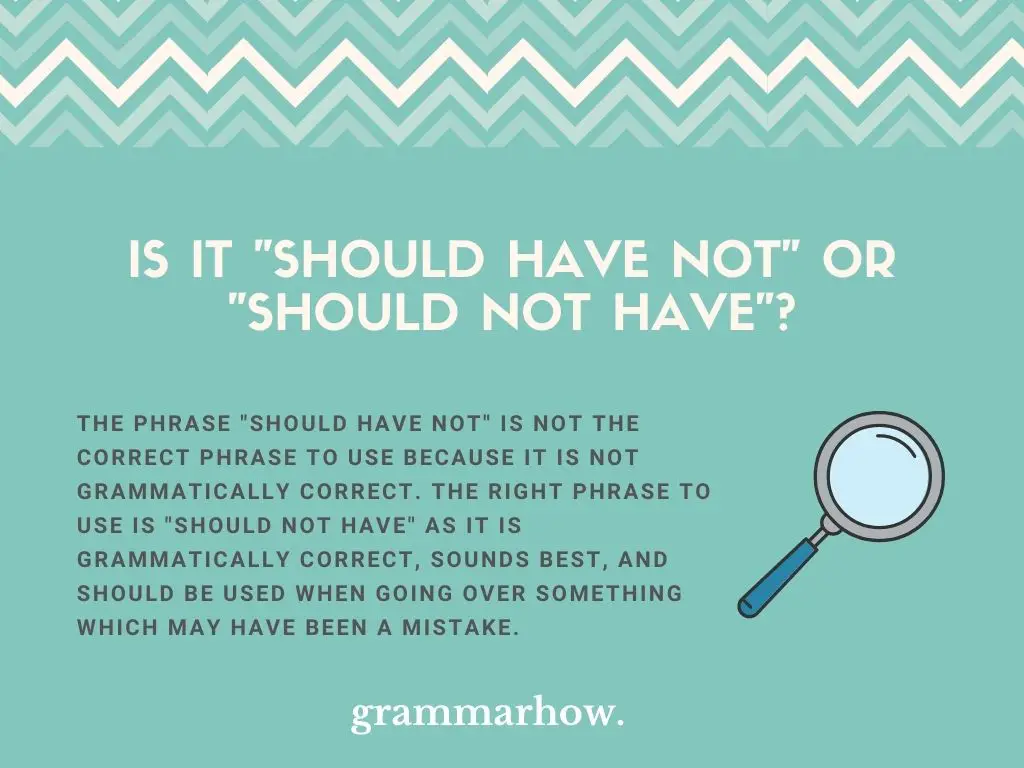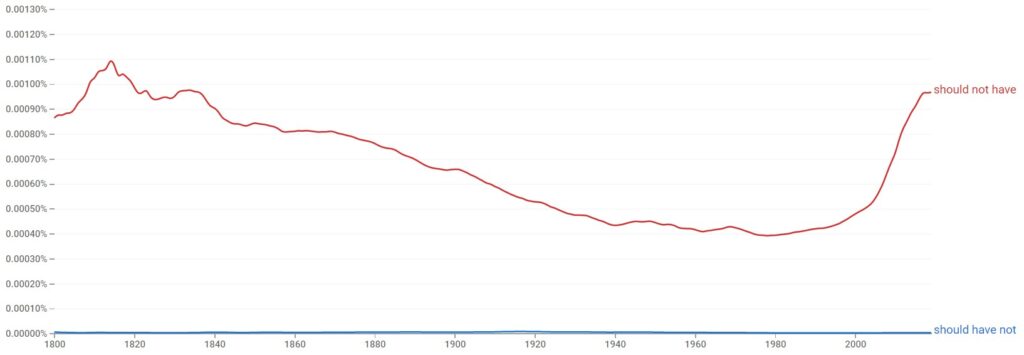Understanding the English language can be a difficult process as there are many nuanced rules that should be adhered to in order for what you say or write to sound correct. The article below will go over the nuances of the phrases “should have not” and “should not have”.
Is It “Should Have Not” Or “Should Not Have”?
The phrase “should have not” is not the correct phrase to use because it is not grammatically correct. The right phrase to use is “should not have” as it is grammatically correct, sounds best, and should be used when going over something which may have been a mistake.

The phrase “should not have” is both grammatically correct while also sounding audibly correct. If you are unsure of which phrase to use, you can form contractions, changing the phrases to “should haven’t” and “shouldn’t have”. As you can see, it becomes very clear “should have not” is wrong.
Is It Ever Correct To Use “Should Have Not”?
It is never correct to use the phrase “should have not” as it is not grammatically correct and sounds incorrect as well. This is supported by this Google Ngram Viewer chart showing the usage of both phrases. As shown, “should have not” is never used.

The reason it is grammatically incorrect to use this phrase is because it places the negative adverb (not) after the second auxiliary verb. Auxiliary verbs show the tense of the statement. However, when you have a negative adverb, you have to place it after the first auxiliary verb (should).
Examples Of How To Use “Should Have Not” And “Should Not Have” In A Sentence
Knowing how to correctly use the phrase “should not have” in a sentence while avoiding the phrase “should have not” can make all the difference in your writing or when you are speaking. If you are ever in doubt about which phrase is correct, try using contractions, such as replacing it with “shouldn’t have” or “should haven’t.”
Provided below are some examples showing how to correctly and incorrectly use the phrases “should have not” and “should have not” in a sentence.
- Correct: You should not have been in that area.
- Incorrect: You should have not been in that area.
- Correct: I really should not have had that second burrito.
- Incorrect: I really should have not had that second burrito.
- Correct: We should not have been anywhere near that abandoned building in the first place!
- Incorrect: We should have not been anywhere near that abandoned building in the first place!
- Correct: He should not have been failing as many classes as he is.
- Incorrect: He should have not been failing as many classes as he is.
- Correct: I know I told you she should not have any of these toys because she’s way too young for them.
- Incorrect: I know I told you she should have not any of these toys because she’s way too young for them.
- Correct: I should not have been anywhere near this far behind on my work.
- Incorrect: I should have not been anywhere near this far behind on my work.
Is It “I Should Have Not Done It” Or “I Should Not Have Done It”?
The correct choice between these two options is the phrase “I should not have done it”. This is because it is grammatically correct while the other phrase, “I should have not done it”, is not grammatically correct, and is therefore not a good choice when writing or speaking.
The reason “I should have not done it” is incorrect is for the same reasons as the aforementioned phrases above. The included phrase “should have not” is what makes the statement incorrect because it places the negative adverb (not) after the second auxiliary verb (have) rather than the first (should).
Here are a few examples for you to reference on the correct and incorrect usage of these two phrases.
- Correct: I really feel as though I should not have done it.
- Incorrect: I really feel as though I should have not done it.
- Correct: I don’t agree with you at all because you think I should not have done it.
- Incorrect: I don’t agree with you at all because you think I should have not done it.
You may also like: “Would Have Not” or “Would Not Have” – Correct Version

Martin holds a Master’s degree in Finance and International Business. He has six years of experience in professional communication with clients, executives, and colleagues. Furthermore, he has teaching experience from Aarhus University. Martin has been featured as an expert in communication and teaching on Forbes and Shopify. Read more about Martin here.
